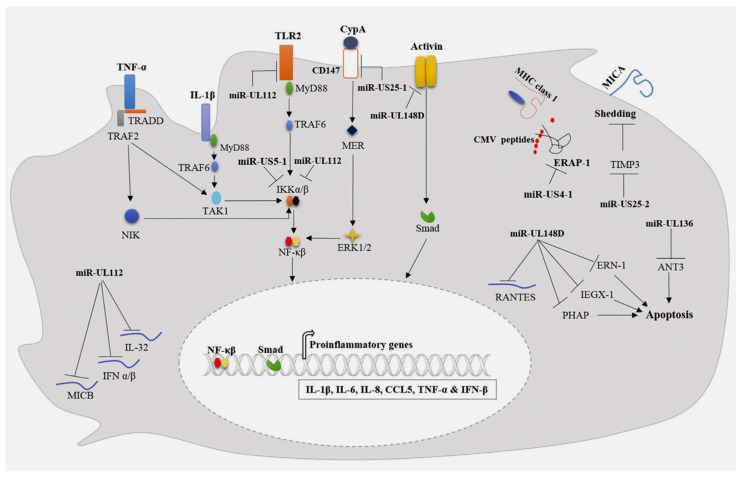Figure 3.
The mechanisms by which cytomegalovirus miRNAs radically change the host immune responses are depicted. The secretion of proinflammatory cytokines is inhibited by miRNA-UL112, which interferes with TLR2 by blocking IL-1β and TNF-α. MiRNA-UL112 induces activation of NF-κB signaling through downregulation of IKKα/β expression. A second action can directly target and block the expression of IL-32, IFN α/β, and MICB, which are directly blocked. The production of proinflammatory cytokines can be induced with a direct action on CD147 by miRNA-U25-1. Furthermore, the secretion of proinflammatory cytokines can be abolished through the direct interference of miRNA-U25-1 with IL-1β and TNF-α, which promotes the activation of NF-κB signaling through the revocation of IKKα/β expression. MiR-UL148D can downregulate the expression of IL-6 and RANTES by interfering with activin receptor type 1B and RANTES mRNA, respectively. Furthermore, cell apoptosis is inhibited by miR-UL148D, which interacts with IEX-1, ERN-1, and PHAP. MiRNA-UL136 can also hinder apoptosis by targeting ANT3 mRNA. The action of MiR-US4-1 is directed on ERAP-1 with an interference mechanism that affects the presentation of viral antigen through MHC class I molecules. MiR-US25-2 can increase MICA loss by targeting TIMP3, Refs. [19,20,29,61,107,108,109,110,111,112,113,114,115]. From Abdalla AE et al. Infect Genet Evol. 2020 Mar; 78:104119.

